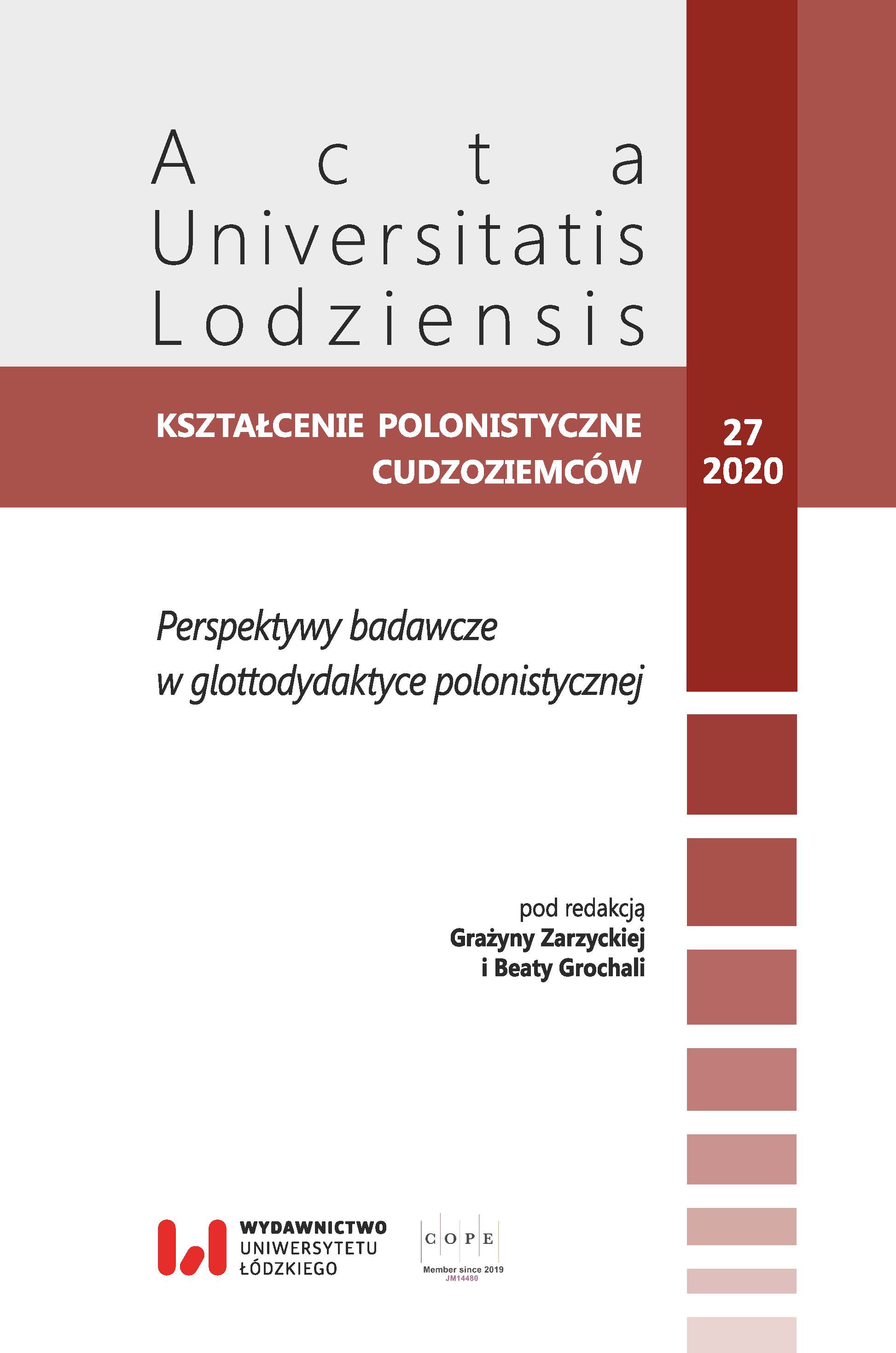Polski jak „kolejny angielski”: postrzeganie transjęzyczności i innych przejawów bilingwalizmu przez tajwańskich studentów uczących się języka angielskiego oraz języka polskiego
DOI:
https://doi.org/10.18778/0860-6587.27.21Słowa kluczowe:
transjęzyczność, dwujęzyczność, wielojęzyczność, Tajwan, język angielski jako obcy, język polski jako obcyAbstrakt
Celem niniejszego artykułu jest przedstawienie tego, jak tajwańscy studenci uczący się języka angielskiego i języka polskiego postrzegają transjęzyczność oraz inne przejawy bilingwizmu na lektoratach. Zgromadzone dane pochodzą z analizy ankiety. Odpowiedzi wskazują na wyraźną przychylność wobec pomysłu posługiwania się wyłącznie językiem docelowym, jednak jedynie 7% uczestników badania wyraziło jednoznaczne przekonanie co do tego, że takie rozwiązanie jest najkorzystniejsze. Ponad 90% skłaniało się ku temu, aby w klasie używać przynajmniej dwóch języków. Zwiększenie skuteczności procesu nauki oraz wspieranie zdolności mówienia i rozumienia ze słuchu wymieniane były jako główne zalety podejścia monolingwalnego. Z drugiej zaś strony praktyki bilingwalne postrzegane są jako te, które ułatwiają dogłębniejsze zrozumienie tematu i wyrażenie własnych myśli. W artykule wyliczono też szereg zadań, które, zdaniem studentów, warto wykonywać wyłącznie w języku docelowym, oraz tych, których chętniej podjęliby się oni w języku rodzimym. Jak wynika z przedstawionej analizy, najkorzystniejszym rozwiązaniem może okazać się taki styl nauczania, który cechuje się pewną elastycznością i łączy w sobie rozmaite techniki pracy na lekcji.
Bibliografia
Anton, E. et al., 2016, Testing Bilingual Educational Methods: A Plea to End the Language-Mixing Taboo, “Language Learning”, issue 66:2, pp. 29–50, https://onlinelibrary.wiley.com/doi/abs/10.1111/lang.12173
Google Scholar
DOI: https://doi.org/10.1111/lang.12173
Baird, A., Palacios, N., Kibler, A., 2016, The Cognate and False Cognate Knowledge of Young Emergent Bilinguals, “Language Learning”, issue 66:2, pp. 448–470, https://onlinelibrary.wiley.com/doi/abs/10.1111/lang.12160
Google Scholar
DOI: https://doi.org/10.1111/lang.12160
Busse, V. et al, 2019, Addressing Linguistic Diversity in the Language Classroom in a Resource-Oriented Way: An Intervention, Study With Primary School Children, “Language Learning”, issue: 70:2, pp. 1–38, https://onlinelibrary.wiley.com/doi/full/10.1111/lang.12382
Google Scholar
DOI: https://doi.org/10.1111/lang.12382
Canagarajah, S., 2011, Codemeshing in Academic Writing: Identifying Teachable Strategies of Translanguaging, “The Modern Language Journal”, issue 95/3, pp. 401–417, https://onlinelibrary.wiley.com/doi/abs/10.1111/j.1540-4781.2011.01207.x
Google Scholar
DOI: https://doi.org/10.1111/j.1540-4781.2011.01207.x
Cenoz, J., Gorter, D., 2011a, A Holistic Approach to Multilingual Education: Introduction, “The Modern Language Journal”, issue 95/3, pp. 339–343, https://onlinelibrary.wiley.com/doi/abs/10.1111/j.1540-4781.2011.01204.x
Google Scholar
DOI: https://doi.org/10.1111/j.1540-4781.2011.01204.x
Cenoz, J., Gorter, D., 2011b, Focus on Multilingualism: A Study of Trilingual Writing, “The Modern Language Journal”, issue 95/3, pp. 356–369, https://onlinelibrary.wiley.com/doi/abs/10.1111/j.1540-4781.2011.01206.x
Google Scholar
DOI: https://doi.org/10.1111/j.1540-4781.2011.01206.x
Creese, A., Blackledge, A., 2010, Translanguaging in the Bilingual Classroom: A Pedagogy for Learning and Teaching?, “The Modern Language Journal”, issue 94/1, pp. 103–115.
Google Scholar
DOI: https://doi.org/10.1111/j.1540-4781.2009.00986.x
Davila, L., 2020, Multilingual Interactions and Learning in High School ESL Classrooms, “TESOL Quarterly”, vol. 54, no. 1, pp. 30–55.
Google Scholar
DOI: https://doi.org/10.1002/tesq.536
Eberhard, D.M., Simons, G.F., Fennig, D. (eds.), 2020, Ethnologue: Languages of the world, 23rd edition, https://www.ethnologue.com [28.05.2020].
Google Scholar
Garcia, O., Sylvan, C., 2011, Pedagogies and Practices in Multilingual Classrooms: Singularities in Pluralities, “The Modern Language Journal”, issue 95/3, pp. 385–400, https://onlinelibrary.wiley.com/doi/abs/10.1111/j.1540-4781.2011.01208.x
Google Scholar
DOI: https://doi.org/10.1111/j.1540-4781.2011.01208.x
Garcia, O., Wei, L., 2014, Translanguaging: Language, Bilingualism, and Education, New York, Palgrave.
Google Scholar
DOI: https://doi.org/10.1057/9781137385765_4
Gorter, D., Cenoz, J., 2011, A Multilingual Approach: Conclusions and Future Perspectives: Afterword, “The Modern Language Journal”, issue 95/3, pp. 442–445, https://onlinelibrary.wiley.com/doi/abs/10.1111/j.1540-4781.2011.01203.x
Google Scholar
DOI: https://doi.org/10.1111/j.1540-4781.2011.01203.x
Holmen, A., 2019, Translanguaging pedagogy, in: Handbook of Pragmatics. 22nd Annual Installment, Jan-Ola Ostman, Jef Verschueren (eds.), pp. 49–58, https://www.org/10.75/hop.22.tra3
Google Scholar
DOI: https://doi.org/10.1075/hop.22.tra3
Lai, Y., 2009, Language Learning Strategy Use and English Proficiency of University Freshmen in Taiwan, “TESOL Quarterly”, vol. 43, no. 2, pp. 255–280.
Google Scholar
DOI: https://doi.org/10.1002/j.1545-7249.2009.tb00167.x
McKinney, C., 2017, Language and Power in Post-Colonial Schooling. Ideologies in Practice, New York and London.
Google Scholar
DOI: https://doi.org/10.4324/9781315730646
National Statistics. Republic of China, Taiwan, 2020, https://eng.stat.gov.tw/point.asp?index=9 https://eng.stat.gov.tw/public/Data/7113143851PNHSNJPU.pdf [03.03.2020].
Google Scholar
Otheguy, R., Garcia, O., Reid, W., 2015, Clarifying translanguaging and deconstructing named languages: A perspective from linguistics, “Applied Linguistics Review”, issue 6, pp. 281–307, https://www.degruyter.com/view/journals/alr/6/3/article-p281.xml
Google Scholar
DOI: https://doi.org/10.1515/applirev-2015-0014
Palmer, D., Martinez, R., Mateus, S, Henderson, K., 2014, Reframing the Debate on Language Separation: Toward a Vision for Translanguaging Pedagogies in the Dual Language Classroom, “The Modern Language Journal”, issue 98/3, pp. 757–772, https://experts.colorado.edu/display/pubid_224764
Google Scholar
DOI: https://doi.org/10.1111/modl.12121
Price, G., 2014, English for all? Neoliberalism, globalization, and language policy in Taiwan, vol. 43, issue 5, pp. 567-589, https://www.cambridge.org/core/journals/language-in-society/article/abs/english-for-all-neoliberalism-globalization-and-language-policy-in-taiwan/9EE5C9AF7FB6E90F644BFFF0615EB9CE
Google Scholar
DOI: https://doi.org/10.1017/S0047404514000566
Price, G., 2019, Language, Society, and the State: From Colonization to Globalization in Taiwan, Boston and Berlin.
Google Scholar
DOI: https://doi.org/10.1515/9781614514640
Rader, D., 2017, Teaching and Learning for Intercultural Understanding. Engaging Young Hearts and Minds, New York and London.
Google Scholar
Wang, H. , Chang, S., 2002, The Commodification of International Marriages: Cross-Border Marriage Business in Taiwan and Viet Nam, “International Migration”, issue 40(6), pp. 93–116, https://onlinelibrary.wiley.com/doi/abs/10.1111/1468-2435.00224
Google Scholar
DOI: https://doi.org/10.1111/1468-2435.00224
Willey, T., Garcia, O., 2016, Language Policy and Planning in Language Education: Legacies, Consequences, and Possibilities, “The Modern Language Journal”, issue 100, pp. 48–63, https://onlinelibrary.wiley.com/doi/abs/10.1111/modl.12303
Google Scholar
DOI: https://doi.org/10.1111/modl.12303
Woodley, H., 2016, From Pain to Healing in Language Teacher Education, “The Modern Language Journal”, issue 100, pp. 570–573, https://onlinelibrary.wiley.com/doi/abs/10.1111/modl.4_12337
Google Scholar
DOI: https://doi.org/10.1111/modl.4_12337
Pobrania
Opublikowane
Jak cytować
Numer
Dział
Licencja

Utwór dostępny jest na licencji Creative Commons Uznanie autorstwa – Użycie niekomercyjne – Bez utworów zależnych 4.0 Międzynarodowe.










